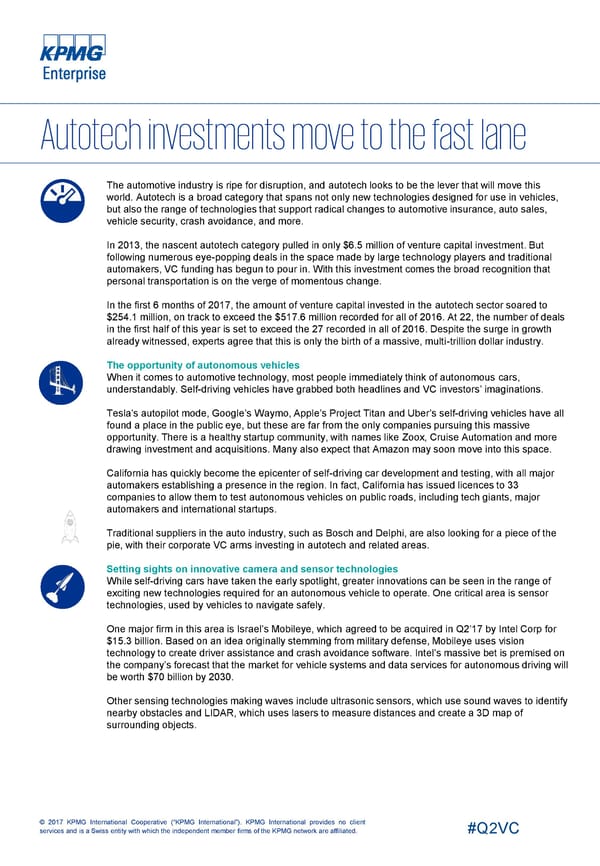The automotive industry is ripe for disruption, and autotech looks to be the lever that will move this world. Autotech is a broad category that spans not only new technologies designed for use in vehicles, but also the range of technologies that support radical changes to automotive insurance, auto sales, vehicle security, crash avoidance, and more. In 2013, the nascent autotech category pulled in only $6.5 million of venture capital investment. But following numerous eye-popping deals in the space made by large technology players and traditional automakers, VC funding has begun to pour in. With this investment comes the broad recognition that personal transportation is on the verge of momentous change. In the first 6 months of 2017, the amount of venture capital invested in the autotech sector soared to $254.1 million, on track to exceed the $517.6 million recorded for all of 2016. At 22, the number of deals in the first half of this year is set to exceed the 27 recorded in all of 2016. Despite the surge in growth already witnessed, experts agree that this is only the birth of a massive, multi-trillion dollar industry. The opportunity of autonomous vehicles When it comes to automotive technology, most people immediately think of autonomous cars, understandably. Self-driving vehicles have grabbed both headlines and VC investors’ imaginations. Tesla’s autopilot mode, Google’s Waymo, Apple’s Project Titan and Uber’s self-driving vehicles have all found a place in the public eye, but these are far from the only companies pursuing this massive opportunity. There is a healthy startup community, with names like Zoox, Cruise Automation and more drawing investment and acquisitions. Many also expect that Amazon may soon move into this space. California has quickly become the epicenter of self-driving car development and testing, with all major automakers establishing a presence in the region. In fact, California has issued licences to 33 companies to allow them to test autonomous vehicles on public roads, including tech giants, major automakers and international startups. Traditional suppliers in the auto industry, such as Bosch and Delphi, are also looking for a piece of the pie, with their corporate VC arms investing in autotech and related areas. Setting sights on innovative camera and sensor technologies While self-driving cars have taken the early spotlight, greater innovations can be seen in the range of exciting new technologies required for an autonomous vehicle to operate. One critical area is sensor technologies, used by vehicles to navigate safely. One major firm in this area is Israel’s Mobileye, which agreed to be acquired in Q2’17 by Intel Corp for $15.3 billion. Based on an idea originally stemming from military defense, Mobileye uses vision technology to create driver assistance and crash avoidance software. Intel’s massive bet is premised on the company’s forecast that the market for vehicle systems and data services for autonomous driving will be worth $70 billion by 2030. Other sensing technologies making waves include ultrasonic sensors, which use sound waves to identify nearby obstacles and LIDAR, which uses lasers to measure distances and create a 3D map of surrounding objects. © 2017 KPMG International Cooperative (“KPMG International”). KPMG International provides no client services and is a Swiss entity with which the independent member firms of the KPMG network are affiliated. #Q2VC
 Global Page 21 Page 23
Global Page 21 Page 23